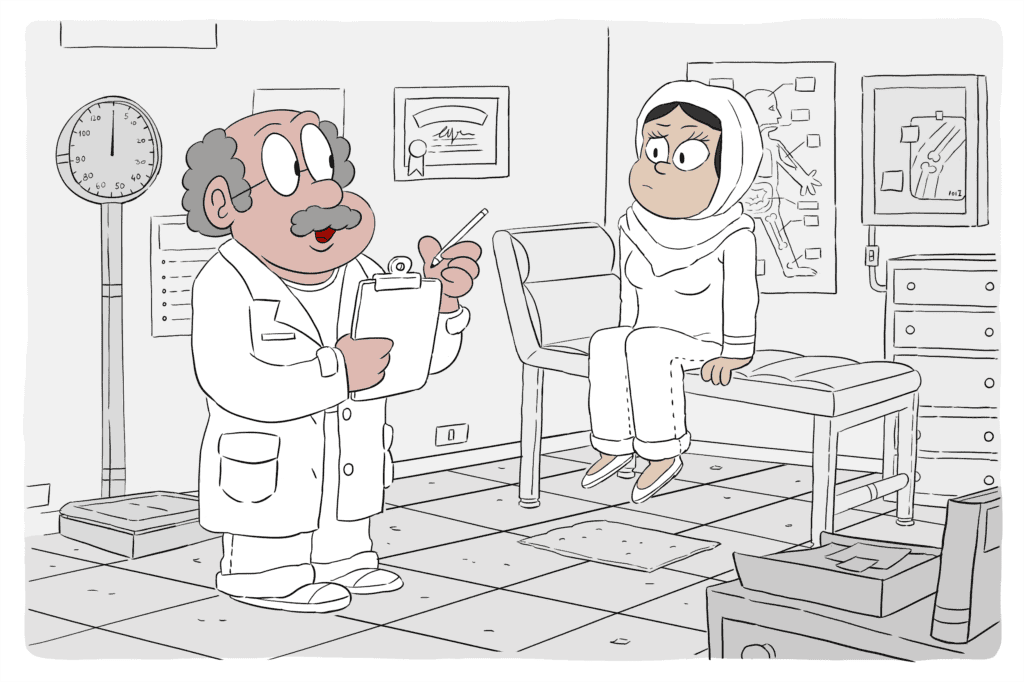
Suhana from Malaysia has been suffering from a headache for several weeks so she decides to go to the doctor.
Suhana: How strange, there is no one there, not even a receptionist. I just sat down in the waiting room. Would I be sitting right? Doesn’t this doctor have an assistant? Oh, the doctor is already calling me. I tell him about my headache. He takes my pulse and my temperature. Then he sits down and asks me where I think this headache is coming from. Well! How am I supposed to know? My doctor in Malaysia would laugh hard when he hears this Dutch doctor asking me what the reason for my headache is! I don’t know if this is a good doctor.
Doctor: There is nothing strange about that woman’s heart rate or temperature. She couldn’t say much about it herself, it must be fatigue or stress. I sent her home and told her to take an aspirin if she has pain. If nothing changes in 2 weeks, she can come back.
What’s going on?
Suhana is not feeling well and goes to the doctor for advice and for help. The consultation does go efficiently but Hanan does not feel fully understood and helped. She cannot believe that a doctor works without an assistant: according to her, a doctor should only do what he is trained to do and therefore not the work of an assistant or receptionist. The doctor then loses authority and status, in her eyes. Hanan expects the doctor to tell her what is wrong with her health. With his experience and expertise, he would find a solution for her – and not ask her what is wrong. After all, she is not a doctor!
Where is the connection?
The doctor could explain better that by feeling heart rate and temperature he can determine that she is otherwise physically fine and that fatigue and stress are often the cause of headaches. He could also ask better questions and give clearer advice, e.g. take 2 hours rest every afternoon, drink plenty of fluids, etc. If Suhana finds this insufficient, she can ask for medication herself, it is not strange in the Netherlands when a patient asks for it. The doctor might then give her something to take only if the pain is too bad. Two weeks later she can tell the doctor if and exactly what helped. D a why is it important to develop good intercultural competence?
Explanation
In Suhana’s experience, doctors are experts in their profession, they are an authority and deserve respect (PDI +). In the Netherlands, a doctor has a profession, which enables him to help others, no more and no less (PDI -; MAS -). Because they can keep their own records efficiently, the receptionist or assistant is not always involved. Often the patient is asked to participate in determining the diagnosis and a solution. Thus, the doctor does not pose as an expert, but works with the patient to find the problem and the best solution. In the Netherlands, patients are not readily sent to (expensive) examinations in the hospital if there is a chance that the problem will disappear in another way.
Awareness of and mutual respect for these differences help nature, Suhana and the Doctor move toward each other and a better understanding of each other and avoid misunderstandings.
Important to know
The story is based on stories that have been shared with us. Connect2Us strives to highlight the story from both sides and not to label people or suggest that one or the other should behave differently. We see in our daily intercultural work that awareness is enough for those involved to move toward each other without denying themselves. Connect2Us focuses on prejudice. Read about prejudice, discrimination and racism here.
